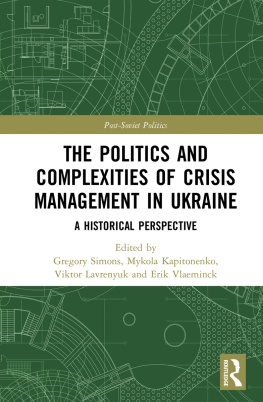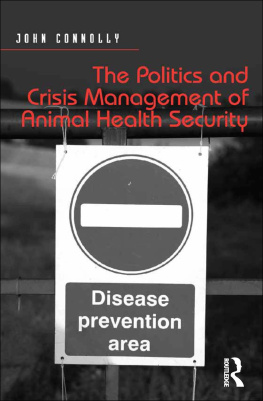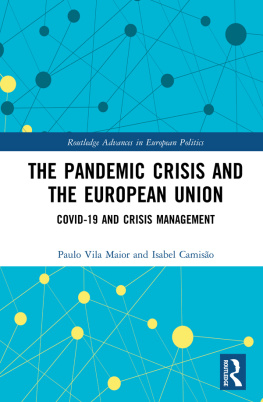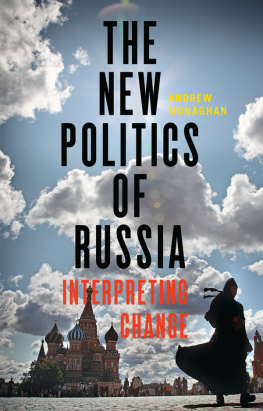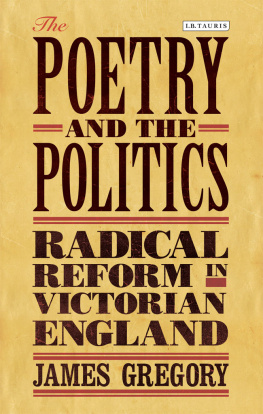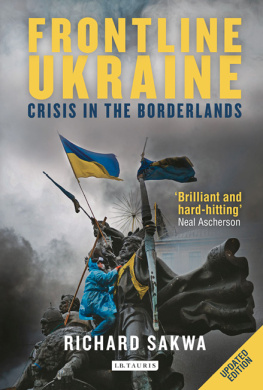Since its independence, the Ukraine has become a laboratory of crisis management. This book, written by a team of Ukrainian scholars, offers a timely analysis of statecraft, institutional design and crisis management in a time of upheaval. A very welcome addition to the crisis literature!
Arjen Boin, Leiden University, Netherlands
This professional volume on a very politicised issue brings to life the complexities of managing crises, via objectively analysed cases that do not put aside the finer details that tend to get lost through the use of subjective interpretation. As such it provides a highly useful account of the subject to scholars, students and practitioners alike.
Valentin Yakushik, Professor of Political Science, National University of Kyiv-Mohyla Academy, Ukraine
The Politics and Complexities of Crisis Management in Ukraine
Ukraine gained its independence from the Soviet Union in 1991. In the decades between the end of the cold war and the crisis of 2014, the country suffered a large decline in agricultural and industrial production, plunging economic indicators into a sharp decline and leading to large-scale poverty and hardship.
This collection by leading scholars from the region explores the various crises affecting Ukraine since independence. Valuable crisis management research is made available from both Russian and Ukrainian sources and the on-going crisis in Ukraine put in context and analysed.
This accessible volume interacts with many disciplines including political science, security studies, crisis management and communication studies; and should prove useful to both students and researchers.
Greg Simons is an Associate Professor in Political Science at Uppsala University, Sweden.
Mykola Kapitonenko is an Associate Professor at the Institute of International Relations of Kyiv National Shevchenko University.
Viktor Lavrenyuk is the Cofounder and Director of the Centre for International Studies, a Ukrainian policy research NGO.
Erik Vlaeminck is a PhD candidate in Russian at the University of Edinburgh.
Post-Soviet Politics
Series Editor Neil Robinson
The last decade has seen rapid and fundamental change in the countries of the former Soviet Union. Although there has been considerable academic comment on these changes over the years, detailed empirical and theoretical research on the transformation of the post-Soviet space is only just beginning to appear as new paradigms are developed to explain change.
Post-Soviet Politics is a series focusing on the politics of change in the states of the former USSR. The series publishes original work that blends theoretical development with empirical research on post-Soviet politics. The series includes work that progresses comparative analysis of post-Soviet politics, as well as case study research on political change in individual post-Soviet states. The series features original research monographs, thematically strong edited collections and specialized texts.
Uniquely, this series brings together the complete spectrum of work on post-Soviet politics, providing a voice for academics world wide.
Most recent published titles
Neighbourhood Perceptions of the Ukraine Crisis
From the Soviet Union into Eurasia?
Edited by Gerhard Besier and Katarzyna Stokosa
Forthcoming titles
RussiaEU Relations and the Common Neighbourhood
Coercion vs. Authority
Irina Busygina
Russian Foreign Policy in Eurasia
National Interests and Regional Integration
Lilia A. Arakelyan
The Politics and Complexities of Crisis Management in Ukraine
A Historical Perspective
Edited by Greg Simons, Mykola Kapitonenko, Viktor Lavrenyuk and Erik Vlaeminck
First published 2018
by Routledge
2 Park Square, Milton Park, Abingdon, Oxon OX14 4RN
and by Routledge
711 Third Avenue, New York, NY 10017
Routledge is an imprint of the Taylor & Francis Group, an informa business
2018 selection and editorial matter, Mykola Kapitonenko, Viktor Lavrenyuk, Erik Vlaeminck and Greg Simons; individual chapters, the contributors
The right of Greg Simons, Mykola Kapitonenko, Viktor Lavrenyuk and Erik Vlaeminck to be identified as the authors of the editorial material, and of the authors for their individual chapters, has been asserted in accordance with sections 77 and 78 of the Copyright, Designs and Patents Act 1988.
All rights reserved. No part of this book may be reprinted or reproduced or utilised in any form or by any electronic, mechanical, or other means, now known or hereafter invented, including photocopying and recording, or in any information storage or retrieval system, without permission in writing from the publishers.
Trademark notice: Product or corporate names may be trademarks or registered trademarks, and are used only for identification and explanation without intent to infringe.
British Library Cataloguing-in-Publication Data
A catalogue record for this book is available from the British Library
Library of Congress Cataloging-in-Publication Data
A catalog record for this book has been requested
ISBN: 9781472460547 (hbk)
ISBN: 9781315554402 (ebk)
Typeset in Times New Roman
by Apex CoVantage, LLC
Sergiy Bozhko has a PhD in Political Science and is a Research Fellow at the Institute of International Relations of Taras Shevchenko National University of Kyiv. He defended his PhD thesis, titled System of Security and Cooperation in the Baltic Sea Region, 1990searly 2000s, in 2005. Sergiy also studied courses at the University of Helsinki (2001), University of Oslo (2004) and the Centre for Policy Studies PIR Centre (Moscow, Russia, 2008). He worked as a project coordinator at the Centre for European and International Studies (Kyiv, 20012003), an attach at the Ministry of Foreign Affairs of Ukraine (2006), a guest researcher and post-doctoral fellow at the Uppsala Centre for Russian and Eurasian Studies of the University of Uppsala, Sweden (2010). Sergiys research interests cover Ukraines European and EuroAtlantic integration and cooperation in security affairs, security and cooperation in the Baltic Sea region and political discourse analysis. He is the author of over 20 scholarly articles, conference papers and book chapters on these topics.
Mykola Kapitonenko has a PhD in Political Science and is an Associate Professor at the Institute of International Relations of Kyiv National Shevchenko University. He defended his PhD (candidate) thesis in 2004. He worked as Assistant Professor from 2001, as Associate Professor of the International Relations and Foreign Policy Department from 2006. From 2001, he was the Executive Director of the Centre of International Relations Studies (CIRS). In 2005, he lectured on courses on conflictology and ethnic conflicts at the University of Iowa (USA). He specializes in conflictology and the theory of negotiations, the history of international relations, actual problems of foreign policy of Ukraine and the theory of international relations. In 2004, he was the winner of the Kyiv National Shevchenko University premium, as well as the traineeship of the Cabinet of Ministers of Ukraine for young scientists. He is the author of over 60 scientific publications.


